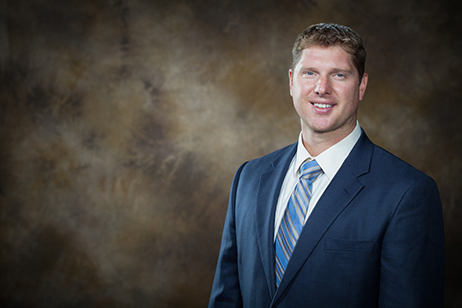FAYETTEVILLE, Ark. – R.J. Elbin, assistant professor of exercise science and director of the Office for Sport Concussion Research at the University of Arkansas, has been named to a panel of 35 of the nation’s leading concussion clinicians and researchers to write a report on best treatments for concussion.
Elbin will join a group that includes medical doctors in neurosurgery, emergency medicine, internal medicine, family practice and primary care; certified athletic trainers; athletic directors; consultants and medical-care providers to college and professional sports teams; and neuropsychologists.
The conference Oct. 15-16 at the University of Pittsburgh Medical Center will provide a consensus paper to be published in the journal Neurosurgery with recommendations for U.S. health-care professionals to use in assessing and treating concussions.
“I’m honored and excited to be recognized in this group of experts on a very timely topic,” Elbin said. “This meeting will provide direction and guidance for moving concussion assessment and treatment from a wait-and-see approach toward a more active, targeted clinical treatment model.”
Also attending the invitation-only conference will be representatives, board members and consultants of the Centers for Disease Control and Prevention, National Institutes of Health, the U.S. Department of Defense, Major League Baseball, the NCAA, NFL, NFL Players Association, USA Football, USA Rugby and U.S. Soccer, among others.
Elbin joined the faculty of the U of A College of Education and Health Professions in the fall of 2013. He established the Office for Sport Concussion Research last year and gathered a group of leading experts for a research summit in Fayetteville last November that focused on concussion in youth sports. The purpose of the U of A-based office is to improve the standard of care for athletes with sport-related concussions through education, research and outreach initiatives.
Elbin has established strategic partnerships with local and regional youth sports organizations, high schools and other academic and medical institutions across the state of Arkansas. The meeting in Pittsburgh, and resulting academic paper, will give Elbin more information and support for his current outreach and research efforts in Arkansas.
“My job as member of the committee is to make sure that our athletic trainers and sports medicine professionals in this area have the most up-to-date information possible,” he said. “Not only am I in a position to help develop new information about concussions, I am also in a unique position to help disseminate it here in Arkansas.”
Every person’s brain is different, Elbin said, and sports medicine professionals need information to help them move away from using a cookie-cutter approach to concussion assessment and treatment, which assumes everyone’s brain is the same.
Elbin also conducts research projects with both undergraduate and graduate students majoring in exercise science, psychology and biology at the U of A. He and his research assistants are working with parents, coaches and athletes themselves to educate them about the signs and symptoms of concussion.
“Getting experts of this caliber in a room to provide direction on how to treat and manage sport-related concussion is long overdue,” Elbin said of the meeting in Pittsburgh. “Currently, many sports medicine professionals are using a wide variety of management and treatment approaches that lack empirical evidence and strong science. Adding evidence to the treatment model is something that concussion researchers are continually trying to do. What we are learning from recent clinical studies at the University of Arkansas is how to use both subjective and objective data to be more targeted in how we treat athletes.”
Elbin received a doctorate in kinesiology from Michigan State University, and he held a post-doctoral research fellowship at the University of Pittsburgh Medical Center Sports Medicine Concussion Program. The Pittsburgh program was the first of its kind when it was started in 2000. It remains the largest such program and is considered an international leader in concussion research.
About the Office for Sport Concussion Research: The University of Arkansas Office for Sport Concussion Research was established in 2014 with the mission of improving, through education, research, and outreach initiatives, the standard of care for athletes with sport-related concussion. Under the direction of Dr. R.J. Elbin, assistant professor in the exercise science program, the Office for Sport Concussion Research is establishing strategic partnerships with local/regional youth sports organizations, high schools, and other academic and medical institutions across the state of Arkansas as well as throughout the country.
About the University of Arkansas: The University of Arkansas provides an internationally competitive education for undergraduate and graduate students in more than 200 academic programs. The university contributes new knowledge, economic development, basic and applied research, and creative activity while also providing service to academic and professional disciplines. The Carnegie Foundation classifies the University of Arkansas among only 2 percent of universities in America that have the highest level of research activity. U.S. News & World Report ranks the University of Arkansas among its top American public research universities. Founded in 1871, the University of Arkansas comprises 10 colleges and schools and maintains a low student-to-faculty ratio that promotes personal attention and close mentoring.
Topics
Contacts
R.J. Elbin, assistant professor of kinesiology
College of Education and Health Professions
479-575-5262,
Heidi Wells, director of communications
College of Education and Health Professions
479-575-3138,
